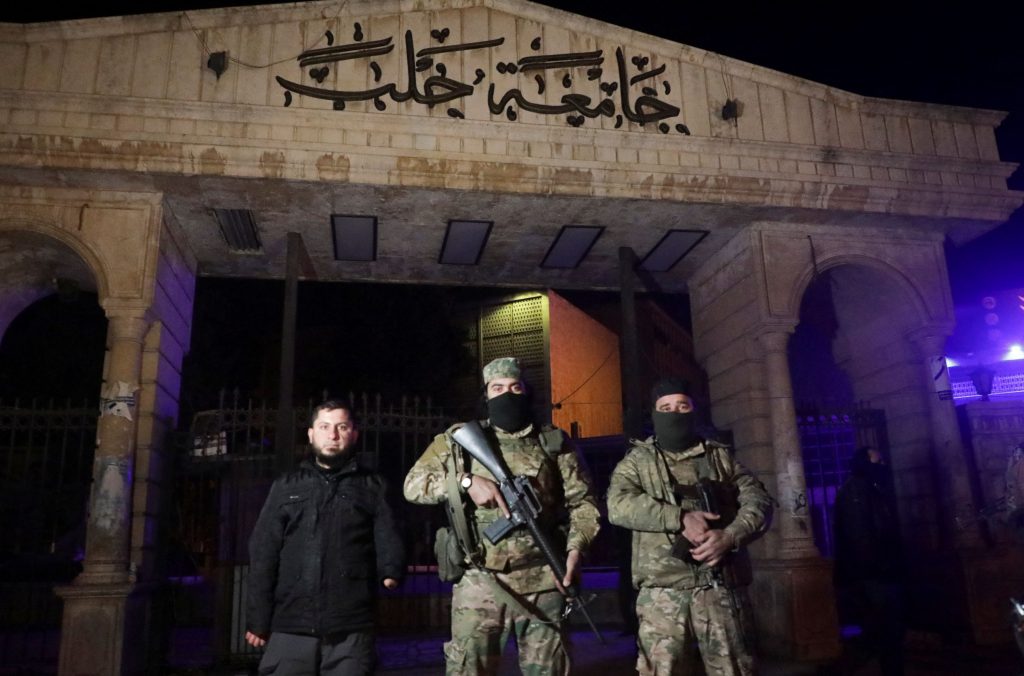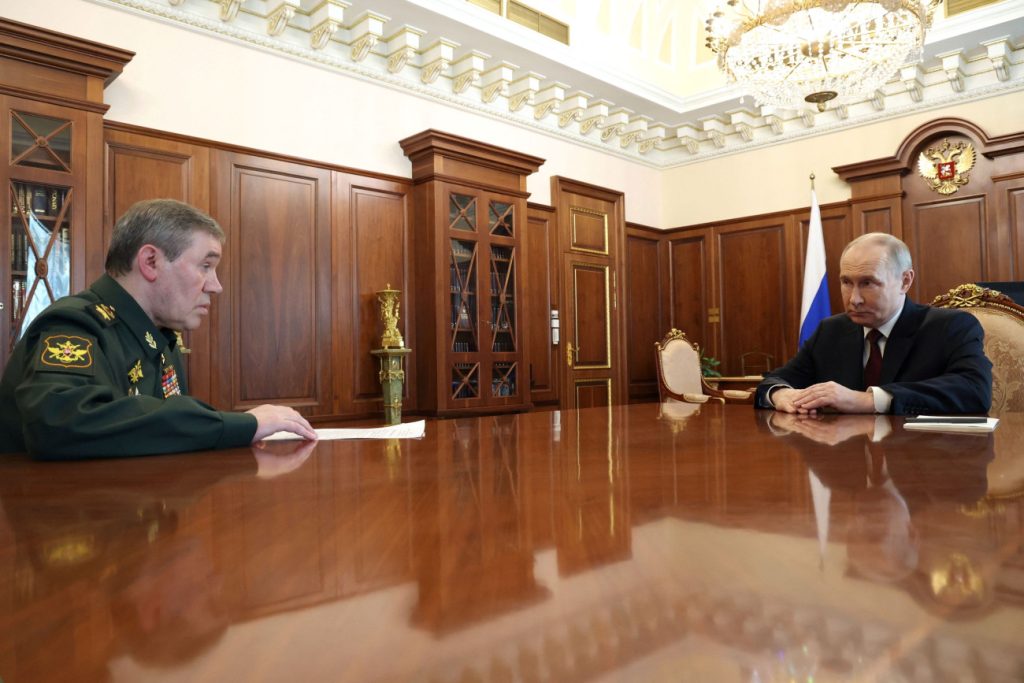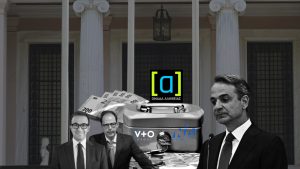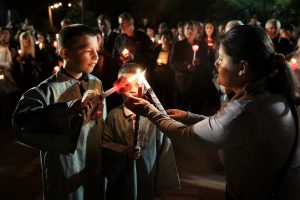The Assad family dictatorship that ruled Syria for more than 50 years spiraled toward collapse Sunday, with rebel forces claiming control of Damascus and the whereabouts of President Bashar al-Assad unknown. The events set off celebrations among the long-repressed population but also sparked concerns about how the disintegration of the regime would reverberate in the region.
Rebel forces poured into the capital overnight, just over a week after launching a campaign that swept through Syria’s biggest cities with lightning speed. Assad fled in the early hours of Sunday local time, according to two Syrian security officials. His destination is unknown, they said.
The government had survived more than a decade of civil war and economic crisis, but its forces caved under the pressure of the fast-moving advances by various rebel groups closing in from the north, south and east.
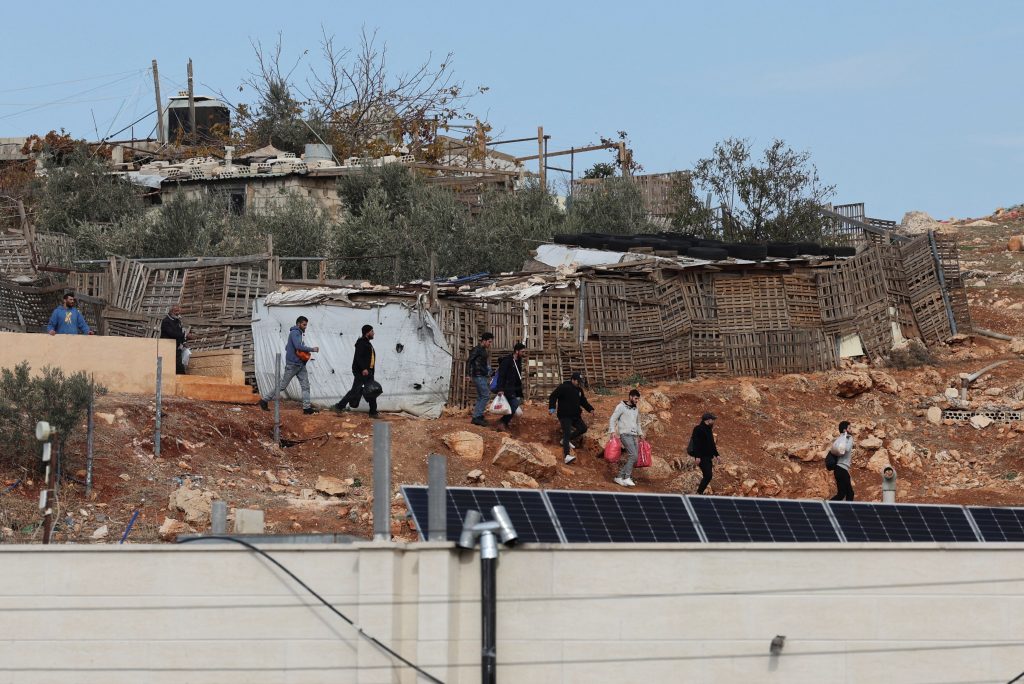
People make their way as they attempt to cross into Syria after Syrian rebels announced that they have ousted President Bashar al-Assad, near Masnaa Border Crossing, Lebanon, December 8, 2024. REUTERS/Amr Abdallah Dalsh
The fighting was the latest dramatic turn in a series of interlinked conflicts that have roiled the Middle East for more than a year—all stretching back to Hamas’s Oct. 7, 2023, assault on southern Israel that sparked the war in the Gaza Strip and then spread to Lebanon and Iran.
The Assads’ government fell victim in part to the wars in Lebanon as well as in Ukraine, which sapped the strength of Russia and Iran-backed Hezbollah, two key sponsors whose militaries had kept the family in power.
Iran, Russia, Turkey, Israel, Arab governments and the U.S.—which has at least 900 troops in the country—are all closely watching events unfold, concerned that deeper disorder in the strategic Middle East country could undermine their own interests. There is concern that a rapid collapse of the regime without planning for succession could create a dangerous vacuum with spillover effects into neighboring countries.
The campaign that led to the Assad regime’s downfall was kicked off by Hayat Tahrir al-Sham , a U.S.-designated terrorist group commanded by Abu Mohammed al-Jawlani , who previously had links to Islamic State and al Qaeda. Jawlani has cut those ties and has pledged to protect Syria’s religious and ethnic diversity, but it is unclear to what extent his transformation is genuine.
The Assads were reviled but preserved a rough balance of power for years in a country divided by a host of sometimes-antagonistic rebel groups and under pressure from outside powers including Turkey, Russia and Iran. In recent days, neighboring countries rushed to solidify their borders to prevent possible spillover from the conflict. Israel said it was reinforcing its forces in the Golan Heights, territory bordering Syria that it has occupied since a 1967 war.
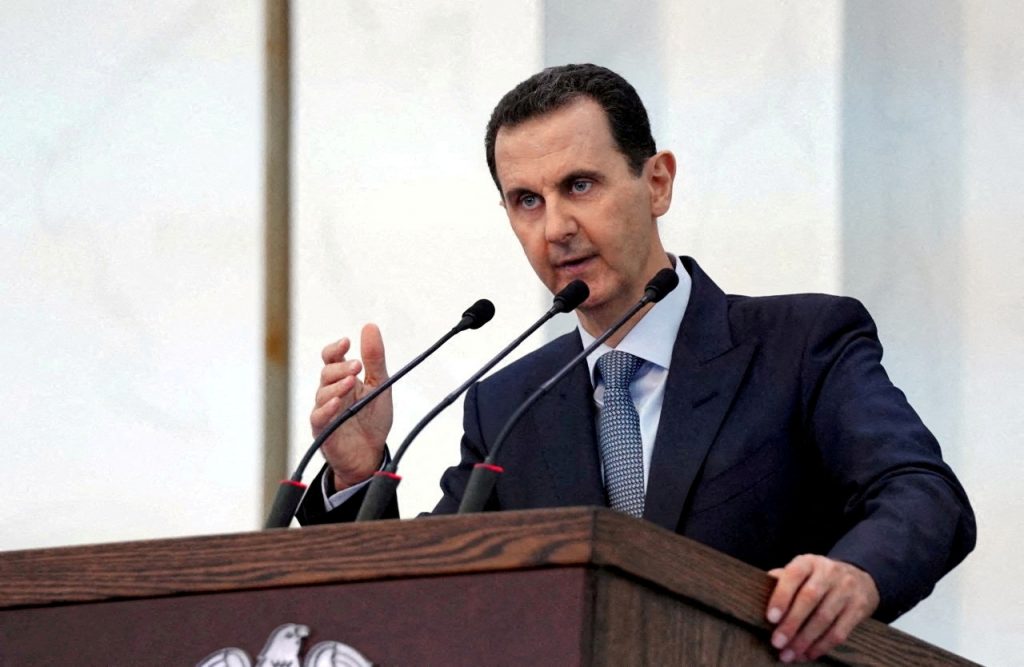
FILE PHOTO: Syria’s President Bashar al-Assad addresses the new members of parliament in Damascus, Syria in this handout released by SANA on August 12, 2020. SANA/Handout via REUTERS ATTENTION EDITORS – THIS IMAGE WAS PROVIDED BY A THIRD PARTY/File Photo
Syria is a small, poor country but has played a central role in the region’s interlinked conflicts. It became a pipeline for weapons supplies to Hezbollah and brought Iran’s influence up to the borders of Israel. It also stockpiled—and used—chemical weapons, which now, it is feared, could wind up in the wrong hands.
Assad had said he would address the nation at 8 p.m. local time on Saturday, but the speech never occurred. His whereabouts couldn’t be determined. People close to the Syrian government were hiding from the fighting in Damascus as rebels rolled through the capital, said an official close to the Assad family.
“It is chaos. We are all under the tables,” he said. “There is shooting outside in the streets.”
“We declare the city of Damascus free from the tyrant Bashar al-Assad,” Lt. Col. Hassan Abdul Ghani, of the rebel military command, said in a social-media post early Sunday local time.
Just hours earlier on Saturday, the rebels said they had seized Homs, a city of 800,000 people that has provided access to Assad’s stronghold in Syria’s coastal areas, where Russia maintains military bases.
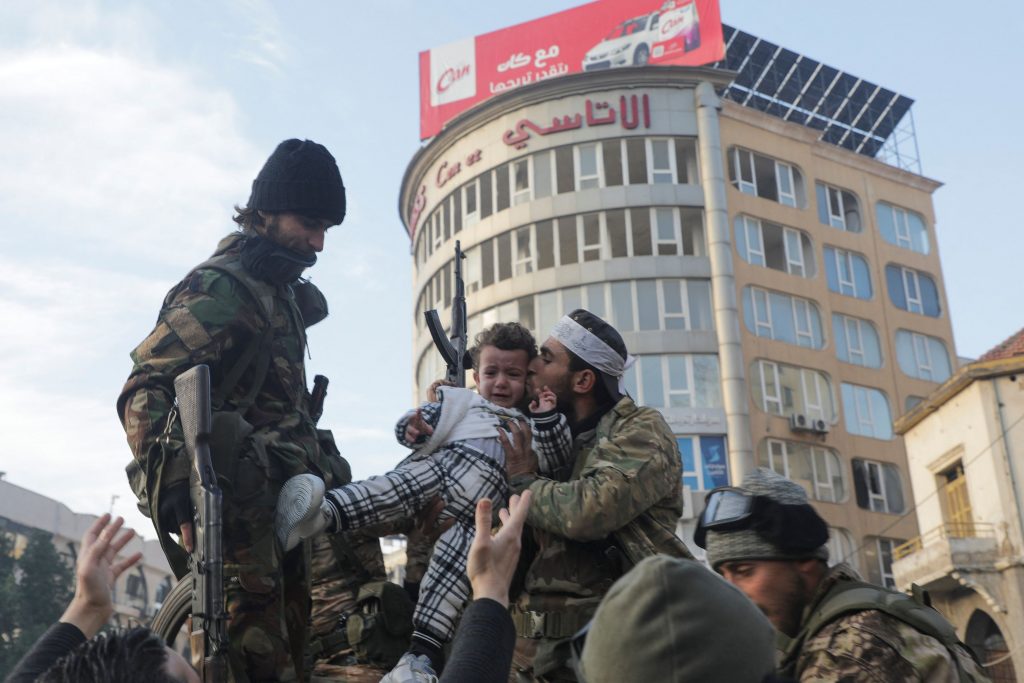
Rebel fighter kisses a child as they gather in Homs after Syria’s army command notified officers on Sunday that President Bashar al-Assad’s 24-year authoritarian rule has ended, a Syrian officer who was informed of the move told Reuters, following a rapid rebel offensive, in Homs, Syria December 8, 2024. REUTERS/Mahmoud Hasano
Syrians driven into exile by the civil war celebrated its fall. Footage purportedly from the city showed residents tying a noose around a statue of Assad’s father, Hafez al-Assad , who led Syria for three decades, and toppling it.
Regime forces had said they had created an unbreakable security cordon around Damascus, but it broke down quickly under pressure from the north, where Hayat Tahrir al-Sham had entered, and from the south, where a separate group of rebels had taken up positions in the capital’s suburbs.
“We made it, we won. We are finally a free country,” said Abdulkafi Alhamdo , an English teacher from Aleppo who recently returned to the city after leaving it in 2016.
As the rebels closed in on Homs, Syrian security agents set documents on fire on the roof of the main intelligence branch before vacating it, said Rim Turkmani , whose friends in the city witnessed the activity from their balconies.
Syrian rebels released hundreds of detainees from a prison dubbed the “human slaughterhouse” after seizing the facility on their march to the capital. As many as 13,000 people were executed in the notorious Saydnaya prison in the first six years after the uprising in 2011, according to Amnesty International. Many others were killed after being repeatedly tortured and systematically deprived of food, water and medicine.
Earlier in the capital, the streets were nearly deserted and supermarket shelves were empty, one resident of the city said. Terrified regime supporters fled toward the coastal areas in vehicles crammed with their belongings. Occasional explosions could be heard from the city’s outskirts.
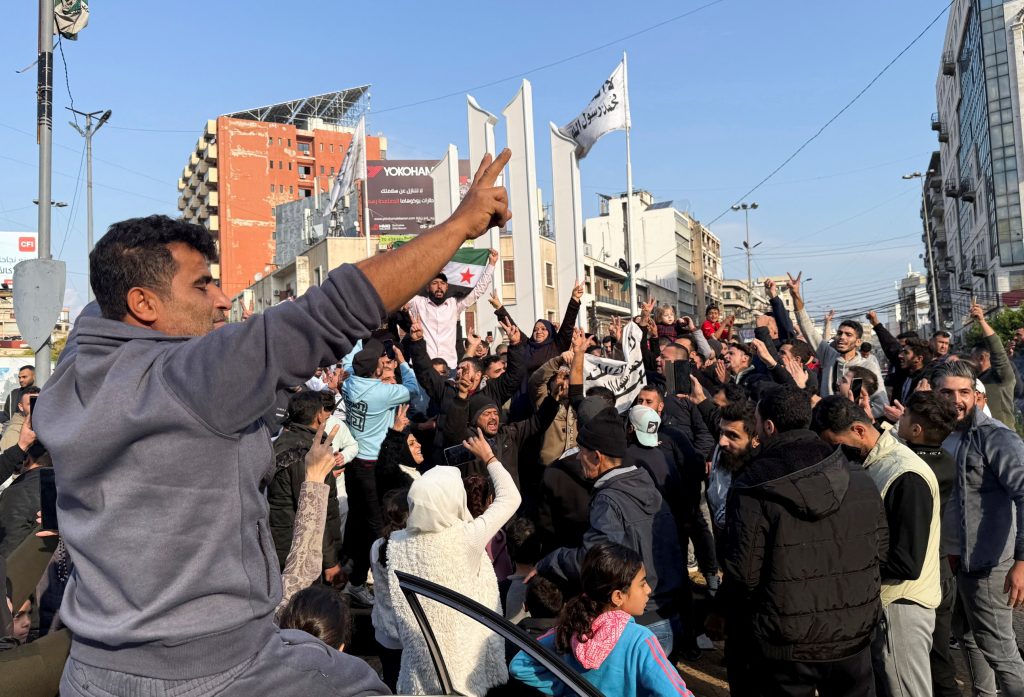
A man gestures as people celebrate, after Syrian rebels announced that they have ousted President Bashar al-Assad, in Tripoli, northern Lebanon December 8, 2024. REUTERS/Omar Ibrahim
Protests against the Assad regime kicked off with the Arab Spring in 2011 and grew into an outright civil war, with multiple parties fighting for control of sections of the country. Iran and Russia in 2015 helped Assad crush the uprising with air power and proxy forces.
Both signaled to the Syrian leader that they couldn’t or wouldn’t intervene this time, people familiar with the messages said. At the same time, one of the people said, the Hayat Tahrir al-Sham rebels, with 25,000 fighters, don’t appear to have the personnel to control and govern the vast territories it has gained in recent days.
“We might see a big, quick victory, and then the problems start,” said a Western diplomat focused on Syria, pointing to the infighting and fractions in Libya that followed the toppling of that country’s longtime ruler, Col. Moammar Gadhafi , in 2011.
The foreign ministers of Russia, Iran and Turkey met on the sidelines of a conference in Qatar to discuss a diplomatic path through the fighting as disparate rebel forces pressed their advance.
With regime forces melting away, Russia might focus on cutting a deal to retain two bases on the Mediterranean coast that enable it to project power across the region, said Michael Kofman , a senior fellow at the Carnegie Endowment for International Peace, a U.S. think tank.
Turkey, a North Atlantic Treaty Organization member that backs the rebels and previously sent its own troops across the border, stands to gain significant sway in Syria.
The meeting in Qatar sought to get the Russians, Iranians and Turks to agree about where the situation in Syria is headed and what they expect from each other, said Vali Nasr , a professor at the Johns Hopkins University School of Advanced International Studies and a former senior State Department adviser.
Qatari Prime Minister Sheikh Mohammed bin Abdulrahman Al Thani said there was an urgent need to devise a political framework for the developments in Syria.
“Our worry is that this will bring us back to the old cycles of internal violence, the civil war, and this is what really threatened the integrity, the territorial integrity, of the state of Syria,” he told the annual policymaking forum in Qatar, a U.S. ally that is also close to Turkey and that has armed some Syrian rebel groups and maintains relations with Iran and Russia.
Write to Summer Said at summer.said@wsj.com , Isabel Coles at isabel.coles@wsj.com and Stephen Kalin at stephen.kalin@wsj.com
